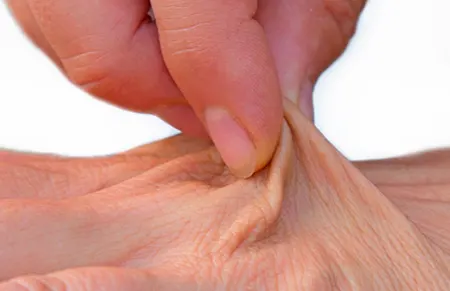Dehydration Dangers: 6 Unexpected Signs That Demand Attention

Introduction to Dehydration
Dehydration occurs when the body loses more fluids than it takes in, leading to an imbalance in the body’s electrolytes. It can be caused by various factors, including excessive sweating, vomiting, diarrhea, or simply not drinking enough fluids. While many are aware of the common signs of dehydration, such as thirst and dark urine, several unexpected signs demand attention.
What are the Causes of Dehydration?
The various factors that can lead to a state of insufficient hydration in the body:

-
Inadequate Fluid Intake: One of the fundamental causes of inadequate hydration is simply not consuming enough fluids throughout the day. This could be due to various reasons such as forgetting to drink water amidst busy schedules or not recognizing the body’s signals for thirst. It’s essential to prioritize regular intake of fluids, particularly water, to maintain proper hydration levels. This is especially crucial during warmer weather or when engaging in physical activities that induce sweating.
-
Excessive Sweating: Sweating is the body’s natural mechanism for regulating temperature, but it also results in the loss of fluids. Whether it’s from intense exercise, exposure to high temperatures, or experiencing a fever, excessive sweating can rapidly deplete the body’s water reserves. It’s important to replenish these lost fluids promptly to prevent dehydration.
-
Diarrhea and Vomiting: Conditions such as diarrhea and vomiting can lead to significant fluid loss and electrolyte imbalance in the body. These symptoms can occur due to various factors, including gastrointestinal infections, food intolerances, or underlying health conditions. It’s crucial to address these issues promptly and seek medical attention if they persist, as prolonged fluid loss can have serious consequences.
-
Frequent Urination: Certain medications, such as diuretics used to manage conditions like high blood pressure or edema, can increase urine output and contribute to dehydration. Additionally, medical conditions like diabetes can also lead to frequent urination, further exacerbating fluid loss. Monitoring fluid intake and adjusting it accordingly can help mitigate the effects of these factors.
-
Alcohol and Caffeine: Beverages containing alcohol or caffeine have diuretic properties, meaning they can increase urine production and lead to fluid loss. While it’s okay to enjoy these beverages in moderation, it’s important to balance their consumption with adequate water intake to prevent dehydration.
-
Illnesses: Certain illnesses, particularly those accompanied by fever or excessive sweating, can predispose individuals to dehydration. Whether it’s a viral infection, bacterial illness, or inflammatory condition, the body’s increased metabolic demands and fluid loss can quickly lead to dehydration. Paying attention to symptoms and seeking appropriate medical care is crucial in managing these situations.
Remember, maintaining proper hydration is essential for overall health and well-being. It’s important to be proactive in preventing dehydration by staying mindful of fluid intake, recognizing the body’s signals for thirst, and addressing any underlying health issues that may contribute to fluid loss. If dehydration is suspected, seeking medical advice promptly is paramount to ensuring proper hydration levels and overall health. Your well-being matters, so prioritize hydration and listen to your body’s needs.
What are the 6 warning signs of dehydration?
The six warning signs that may indicate your body’s need for adequate hydration:

-
Extreme Thirst: One of the most noticeable signals of insufficient hydration is an overwhelming sensation of thirst. When your body lacks the necessary fluids, it sends a clear message that it requires more water to function optimally. Paying heed to this signal and promptly replenishing fluids is crucial for maintaining hydration balance.
-
Less Frequent Urination: Monitoring your urine output can provide valuable insights into your hydration status. A decrease in the frequency of urination or prolonged periods without urinating may indicate dehydration. This occurs because the body conserves water when it’s in short supply, resulting in reduced urine production. Being mindful of changes in urination patterns can help you recognize and address dehydration promptly.
-
Dark-Colored Urine: The color of your urine can serve as a visual indicator of hydration levels. Normally, well-hydrated individuals excrete pale yellow urine, indicating adequate fluid intake. However, dark-colored urine suggests concentrated urine, a common sign of dehydration. Observing changes in urine color and adjusting fluid intake accordingly is essential for maintaining hydration balance.
-
Fatigue: Feeling unusually tired or fatigued can be a subtle yet significant sign of dehydration. Proper hydration is vital for supporting various bodily functions, including energy metabolism. Inadequate fluid intake can lead to decreased blood volume and oxygen delivery to tissues, resulting in feelings of fatigue and lethargy. Prioritizing hydration can help alleviate fatigue and promote overall well-being.
-
Dizziness: Sudden bouts of dizziness or lightheadedness may be indicative of inadequate fluid intake. Hydration plays a crucial role in regulating blood pressure and circulation. Insufficient hydration can lead to decreased blood volume and compromised blood flow to the brain, resulting in dizziness. Ensuring adequate fluid intake can help prevent this symptom and maintain equilibrium.
- Confusion: Alterations in mental clarity, confusion, or disorientation can occur when the brain is deprived of adequate hydration. Water is essential for proper brain function, and dehydration can impair cognitive abilities and lead to confusion. Addressing hydration status promptly is crucial for restoring mental acuity and preventing further complications.
It’s important to recognize that even mild dehydration can have significant consequences on overall health and well-being. Staying vigilant and attentive to these warning signs is essential for maintaining proper hydration levels. Remember to prioritize hydration by drinking water regularly and paying heed to your body’s signals. Your health and vitality depend on it!
What is the best way to prevent hydration?
Hydration plays a vital role in supporting overall health and well-being, impacting various bodily functions and processes. To ensure adequate hydration and prevent the onset of dehydration, it’s important to incorporate the following strategies into your daily routine:
- Drink Plenty of Water: Water is the cornerstone of hydration. Aim to consume at least eight 8-ounce glasses of water each day, although individual requirements may vary based on factors such as activity level, environmental conditions, and personal needs. Adjusting your water intake accordingly is essential for maintaining hydration balance.
- Monitor Urine Color: Monitoring the color of your urine can provide valuable insights into your hydration status. Ideally, urine should appear pale yellow, indicating adequate hydration. Dark yellow or amber-colored urine may signify dehydration, signaling the need to increase fluid intake promptly.
- Include Hydrating Foods: In addition to drinking water, incorporating hydrating foods into your diet can contribute to overall hydration levels. Foods with high water content, such as watermelon, cucumber, oranges, and lettuce, can supplement your fluid intake and support hydration.
- Limit Diuretics: Diuretic substances like alcohol and caffeine have a dehydrating effect on the body by increasing urine production. To prevent excessive fluid loss, it’s advisable to moderate the consumption of these beverages and opt for water as the primary source of hydration.
- Hydrate During Exercise: Physical activity increases the body’s fluid requirements due to sweating and increased respiration. To prevent dehydration during exercise, it’s essential to drink water before, during, and after physical activity to replenish lost fluids and maintain hydration levels.
- Listen to Your Body: Thirst is the body’s natural mechanism for signaling the need for fluid intake. It’s important to pay attention to cues of thirst and respond promptly by drinking water when you feel thirsty. Ignoring thirst signals can lead to dehydration, negatively impacting overall health and well-being.
In short, prioritizing hydration is essential for supporting optimal health and functioning. By adopting these strategies and being mindful of your body’s hydration needs, you can effectively prevent dehydration and maintain overall well-being. Remember, staying hydrated is a simple yet crucial aspect of a healthy lifestyle.
What are the 4 ways to treat dehydration?
When it comes to addressing dehydration, there are various effective approaches tailored to the severity and underlying cause of the condition. Here are four strategies for managing dehydration:
- Oral Rehydration Solution (ORS): For infants and children experiencing mild dehydration due to factors such as diarrhea, vomiting, or fever, utilizing an oral rehydration solution (ORS) can be beneficial. ORS products, available over-the-counter, contain precise proportions of water and salts to replenish lost fluids and electrolytes. Administer small amounts of the solution (about a teaspoon every one to five minutes), gradually increasing as tolerated. Syringes can aid in precise dosing for younger children, while older children may benefit from diluted sports drinks mixed with water.
- Increased Fluid Intake: Adults experiencing mild to moderate dehydration as a result of diarrhea, vomiting, or fever can typically improve by increasing fluid intake. Opt for water or other clear liquids over full-strength fruit juices or soft drinks. Drinking cool water is particularly advisable, especially when exposed to hot or humid environments. Sports drinks containing electrolytes and a carbohydrate solution may also aid in rehydration.
- Emergency Medical Treatment: Severe dehydration warrants immediate medical attention, especially in children and adults exhibiting symptoms such as lethargy, confusion, or diminished responsiveness. In such cases, it’s crucial to contact emergency personnel or proceed to a hospital promptly. Intravenous administration of fluids and salts directly into a vein can expedite the rehydration process and prevent complications.
- Self-Care Measures: In less severe instances of dehydration, several self-care measures can be employed at home:
- Aim to consume at least six glasses of fluids daily.
- Increase fluid intake, particularly on hot days or after prolonged physical activity.
- Opt for fluids containing electrolytes before, during, and after exercise sessions.
- Avoid exposure to excessively hot or humid environments.
- Refrain from consuming ice-cold water, as it may shock the system.
- Find comfort by lying down with a cool, damp towel placed on the forehead.
It’s essential to recognize the signs of dehydration early and initiate appropriate treatment to prevent complications. If severe dehydration is suspected, seeking professional medical assistance without delay is imperative.
Why are electrolytes important for dehydration?
Electrolytes, minerals carrying an electric charge when dissolved in water, are integral for bodily functions and maintaining fluid balance within and outside cells. These charged particles ensure cells receive adequate water and nutrients, regulating chemical reactions essential for overall health. Key electrolytes like sodium, potassium, chloride, bicarbonate, calcium, and phosphate play vital roles in muscle function, nerve impulses, bone health, and energy production.
Dehydration, a condition where the body loses more fluids than it takes in, often leads to electrolyte imbalance, posing various health risks. Factors contributing to electrolyte imbalance include illnesses causing vomiting or diarrhea, heat-related conditions, intense exercise, inadequate fluid intake, and certain medications. Symptoms of imbalance include headaches, irregular heartbeat, fatigue, muscle cramps, and confusion. Electrolyte water, containing added minerals like sodium and potassium, aids in restoring electrolyte balance and supporting bodily functions, available in forms such as sports drinks, coconut water, and oral rehydration solutions. Prioritizing hydration and electrolyte balance through natural foods or fortified beverages is crucial for maintaining overall health and well-being.
Dehydration in Children: Causes and Signs
Dehydration poses a significant risk, particularly to young children and older adults, as it occurs when the body loses more fluids than it takes in. Understanding the causes and signs of dehydration in children is crucial for early recognition and intervention. The primary causes of dehydration in young children include severe diarrhea and vomiting, leading to rapid loss of water and electrolytes. Additionally, fever can exacerbate dehydration, especially when coupled with other symptoms like diarrhea and vomiting. Vigorous exercise without sufficient fluid intake, particularly in hot weather, can also predispose individuals of any age group to dehydration.
Recognizing the signs of dehydration by age is essential for prompt action. In infants and young children, indicators such as dry mouth and tongue, absence of tears when crying, lack of wet diapers for an extended period, sunken eyes and cheeks, sunken soft spots on the skull, and irritability or listlessness may signify dehydration.
In adults, symptoms such as extreme thirst, decreased urination frequency, dark-colored urine, fatigue, dizziness, and confusion may indicate dehydration. Seeking medical attention promptly is crucial, especially if dehydration persists or if concerning symptoms arise, such as excessive tiredness, confusion, seizures, or bloody or black stool. Early recognition and appropriate treatment are vital for preventing complications associated with dehydration. It’s important to remain vigilant and prioritize hydration to safeguard against this potentially serious condition.
Conclusion:
In conclusion, recognizing the causes and signs of inadequate fluid intake in children is paramount for maintaining their health and well-being. Factors such as severe diarrhea, vomiting, fever, and vigorous exercise in hot weather can predispose children to significant fluid and electrolyte loss, making them particularly vulnerable to complications. Understanding the specific signs of dehydration in different age groups, from infants to adults, enables caregivers to intervene promptly and seek appropriate medical attention when necessary.
Additionally, knowing when to seek medical help is crucial in preventing potential complications associated with insufficient fluid intake. Certain indicators, such as persistent diarrhea, extreme lethargy, disorientation, and inability to retain fluids, warrant immediate medical attention to address underlying issues and prevent further deterioration of health. For children, in particular, observing symptoms like excessive tiredness, confusion, or rapid pulse requires urgent medical evaluation to ensure timely intervention and management.
Ultimately, prioritizing hydration and being vigilant about recognizing early warning signs are essential for safeguarding children’s health. By fostering a proactive approach to monitoring fluid intake and promptly addressing any signs of concern, caregivers can play a vital role in preventing adverse outcomes and promoting optimal health for children of all ages. Remember, staying informed and proactive is key to ensuring the well-being of our little ones.
FAQs:
Q: How can I tell if my child is becoming dehydrated?
Answer: Look out for signs such as dry mouth and tongue, decreased urine output, sunken eyes, and irritability. These indicators may suggest that your child needs more fluids to maintain proper hydration.
Q: What should I do if my child has diarrhea or vomiting?
Answer: If your child is experiencing diarrhea or vomiting, it’s essential to monitor their fluid intake closely. Encourage small, frequent sips of water or oral rehydration solutions to replace lost fluids and electrolytes. Seek medical advice if symptoms persist or worsen.
Q: Is it normal for children to have dark-colored urine?
Answer: Dark-colored urine in children can indicate concentrated urine, which may suggest insufficient hydration. Encourage your child to drink more fluids, and monitor their urine color to ensure it returns to a lighter shade.
Q: How can I prevent dehydration in my child during hot weather or physical activity?
Answer: Ensure your child drinks plenty of fluids before, during, and after outdoor activities or exercise, especially in hot weather. Offer water-rich foods such as fruits and vegetables, and encourage breaks for hydration during play or sports.
Q: When should I seek medical help for my child’s symptoms?
Answer: If your child shows signs of severe dehydration, such as extreme lethargy, confusion, or inability to retain fluids, seek immediate medical attention. Additionally, if your child experiences persistent diarrhea, excessive tiredness, or other concerning symptoms, consult a healthcare professional for proper evaluation and treatment.













